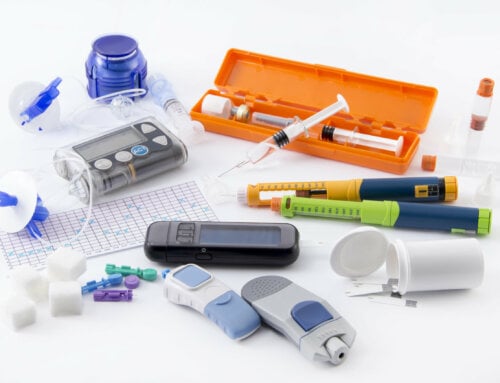Recent research has shown diabetes could be a risk factor for Alzheimer’s disease and people with Alzheimer’s can be more prone to developing diabetes. Many of the reasons are still unknown, but additional information is slowly becoming available. Discover the latest updates about diabetes and Alzheimer’s.
- Both diabetes and Alzheimer’s can increase the damage done to your memory and cognitive functions. This is primarily because of insulin resistance and inflammation. The body is unable to use insulin properly. As a result the brain might not get enough glucose which has a negative impact on thought processes. Maintaining proper blood sugar levels can help.
- Research has now shown the link between certain foods and feelings of fatigue, hunger and mood disorders. A study conducted in Australia showed the risk of reduced memory and depression is increased when people eat processed foods. This includes regular soda, chips, bagged and boxed foods and pizza. Memory loss is further accelerated when people have a diet high in trans-fats, saturated fats and refined sugars. Eating saturated fats can also have a poor effect on your response to stress which can lead to elevated cortisol levels and soaring blood sugar levels. Eat whole foods that are dense in nutrients to protect against diabetes and Alzheimer’s. Get protein by snacking on a handful of unsalted seeds or nuts. Add vegetables and legumes to your daily diet, such as garbanzo beans and black eye peas. Eat healthy fats such as olives, olive oil and avocadoes.
Vitamins B6, B-12 and E may boost your mood and improve brain function. Try a handful of walnuts to increase serotonin levels for a better mood. Hazel nuts have both vitamins B6 and E. Add almonds for a dash of riboflavin to support memory. Low-fat dairy is a good source of vitamin B-12, including low-fat Mozzarella cheese and fat-free yogurt. Seafood, such as tuna, has vitamin B-12 and omega-3s for improved brain function. Salmon and flax seeds also contain omega-3s. Add colorful berries to your diet, such as raspberries and blueberries, for healthy flavonoids and antioxidants. Try to get your essential vitamins by eating the right foods rather than taking supplements. If you think you are not getting enough nutrients, discuss nutritional supplements with your doctor. Think about adopting a healthy diet recently referred to as the “brain diet.” This may include DASH (dietary approaches to stop hypertension), the Mediterranean diet or a combination of the two. It might also be helpful to consult with a dietitian or a diabetes nurse educator.
- Limit your intake of red meat which has saturated fat and cut away all the visible fat when you do eat it. Stay away from whole-fat dairy foods and beverages. Remove the skin from poultry and avoid eating battered or fried foods. Other items to limit or avoid completely include margarine, shortening, cake mixes and frosting. Healthy fats are found in fatty fish such as salmon.
- Get rid of bad habits that can have a negative impact on your brain function and overall health. Quit smoking and limit your alcohol intake. Fit exercise into your day. Stretch, lift weights, do resistance training and engage in heart-healthy exercise for about a half hour each day. Consider walking, swimming, using resistance bands and doing yoga to help you stay fit and balanced. Losing only 5-10 percent of your body weight can help. Do your best to keep your A1C close to 6.5 to 7 percent.
- A healthy lifestyle can minimize the risk of developing Alzheimer’s when you have diabetes. A Washington University study done in St. Louis showed elevated blood sugar levels can boost levels of amyloid beta, a component of the brain plaques found in Alzheimer’s patients. These plaques are found during the early stages of Alzheimer’s. Extremely elevated blood sugars and memory disorders can also lead to other neurological or physical conditions such as urinary leakage that requires the use of incontinence supplies. Talk to your health care team about proper diabetes self-management. Take medications as directed, control blood sugars and adopt positive lifestyle habits that reduce your risk of developing conditions such as Alzheimer’s disease.
- When it comes to brain power, if you don’t use it, you may lose it. Keep your mind active by reading educational materials, playing games such as Sudoku or doing crossword puzzles. Mix it up by visiting one of the many brain training websites to exercise your mind. Take a class and try to learn something new.
From proper diet to mental exercises, there are ways to ward off Alzheimer’s when you have diabetes. Understanding the connection between diabetes and Alzheimer’s is the first step toward improved well-being. As researchers continue to study this connection, more information and treatments will become available.

 Vitamins B6, B-12 and E may boost your mood and improve brain function. Try a handful of walnuts to increase serotonin levels for a better mood. Hazel nuts have both vitamins B6 and E. Add almonds for a dash of riboflavin to support memory. Low-fat dairy is a good source of vitamin B-12, including low-fat Mozzarella cheese and fat-free yogurt. Seafood, such as tuna, has vitamin B-12 and omega-3s for improved brain function. Salmon and flax seeds also contain omega-3s. Add colorful berries to your diet, such as raspberries and blueberries, for healthy flavonoids and antioxidants. Try to get your essential vitamins by eating the right foods rather than taking supplements. If you think you are not getting enough nutrients, discuss nutritional supplements with your doctor. Think about adopting a healthy diet recently referred to as the “brain diet.” This may include DASH (dietary approaches to stop hypertension), the Mediterranean diet or a combination of the two. It might also be helpful to consult with a dietitian or a diabetes nurse educator.
Vitamins B6, B-12 and E may boost your mood and improve brain function. Try a handful of walnuts to increase serotonin levels for a better mood. Hazel nuts have both vitamins B6 and E. Add almonds for a dash of riboflavin to support memory. Low-fat dairy is a good source of vitamin B-12, including low-fat Mozzarella cheese and fat-free yogurt. Seafood, such as tuna, has vitamin B-12 and omega-3s for improved brain function. Salmon and flax seeds also contain omega-3s. Add colorful berries to your diet, such as raspberries and blueberries, for healthy flavonoids and antioxidants. Try to get your essential vitamins by eating the right foods rather than taking supplements. If you think you are not getting enough nutrients, discuss nutritional supplements with your doctor. Think about adopting a healthy diet recently referred to as the “brain diet.” This may include DASH (dietary approaches to stop hypertension), the Mediterranean diet or a combination of the two. It might also be helpful to consult with a dietitian or a diabetes nurse educator.





Leave A Comment